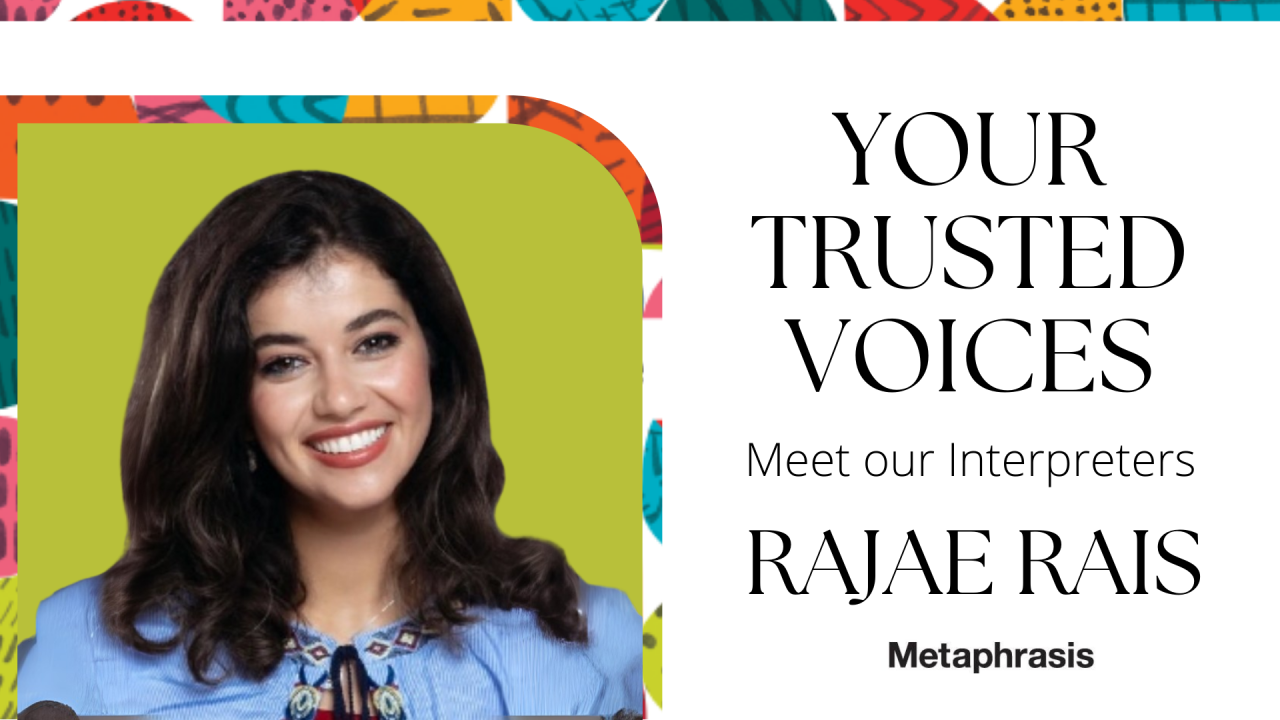
Interpreter Spotlight: Rajae Rais!
Behind every interpreter is a story. Meet Rajae Rais, CHI™, one of our standout French and Arabic interpreters at Metaphrasis. In this article, she opens up about her background, the challenges she faces, and what inspires her to keep showing up to help people feel seen and heard every day.
At Metaphrasis, we’re proud to work with talented and dedicated interpreters who bridge language barriers to make a meaningful difference in people’s lives. One of our standout interpreters, Rajae Rais, recently shared insight into her journey as a trilingual interpreter fluent in Arabic, French, and English.
“My days vary significantly,” Rajae explains, “from interpreting at medical appointments to school conferences and immigration hearings.” Whether she’s in a hospital, clinic, IEP meeting, or immigration proceeding, each day brings something new—and often, something challenging. Her ability to adapt across these environments with professionalism and compassion reflects the heart of what we value at Metaphrasis: trusted voices helping people feel seen, heard, and understood. We had the chance to ask Rajae a few questions about her background, experience, and what drives her in this vital work. Here’s what she shared:
How long have you worked with Metaphrasis?
“I began working with Metaphrasis in 2022, providing both medical and educational interpretation. It’s been a fulfilling experience working in a variety of environments, from hospitals to schools.”
What led you to become an interpreter, and what kind of training or certifications do you have?
“I’ve always had a passion for languages. I studied French from preschool and began learning English in high school. While working at an American school overseas, I served as a facilitator during parent-teacher conferences, IEP meetings, and staff events, which gave me hands-on experience bridging communication gaps. I’ve also always loved helping others, especially members of my community, whether they are patients or immigrants. To support my work as an interpreter, I hold the CHI™ Certified Medical Interpreter credential, as well as a 40-hour Qualified Arabic Medical Interpreter training from ALTA Language Services. Additionally, I’m a Certified Medical Assistant and Phlebotomist, accredited by the National Health career Association (NHA).”
What’s the most challenging part of your work? The most rewarding?
“The hardest part is staying calm and neutral, especially during emotional or complicated medical situations. However, the most rewarding part is knowing that my presence helped facilitate communication during critical moments, whether for patients, students, or immigrants. It’s truly fulfilling to know you’ve made a positive impact.”
Can you share a moment where your interpretation really made a difference for someone, and how do you handle emotionally difficult assignments?
“During an IEP meeting, I interpreted for a parent of a child with autism who was overwhelmed and unsure about the special education plan. The parent spoke Moroccan Arabic, one of the most challenging Arabic dialects, so it required not only language fluency but cultural sensitivity as well. By helping them fully understand the services being offered, I empowered them to take an active role in their child’s future. I stay neutral but compassionate during tough assignments. If it gets overwhelming, I usually talk to a colleague or take a few quiet moments to meditate.”
What’s something people often misunderstand about interpreters?
“Many people think interpreters only translate words. In reality, we interpret meaning, tone, idioms, and cultural context while maintaining transparency and confidentiality. It’s a lot more nuanced than just a direct translation of words.”
What does “language access” mean to you personally?
“To me, language access is about ensuring that everyone has the ability to understand and be understood. It’s about breaking down barriers and ensuring that language is never a hindrance to a person’s ability to get the care, services, or education they deserve. This is something I emphasize to my students when teaching interpretation—it’s not just about words, it’s about people.”
We’re grateful to have interpreters like her on our team, who bring not only language proficiency but also deep compassion and cultural sensitivity to their work. If you’d like to learn more about language access or how we can assist with your interpreting needs, please don’t hesitate to reach out.
